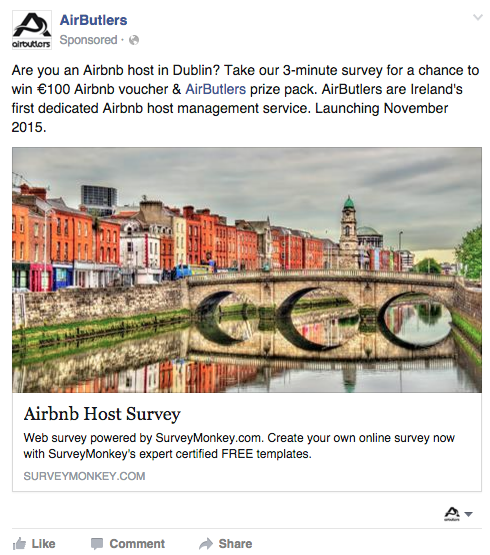Zero To €100k Revenue In 12 Months
2 years ago today, I launched HostButlers. Over the next 12 weeks, I’m going take you on the journey of how I bootstrapped my business from zero to €100k in 12 months.
We will explore everything from idea creation, launching a business without a finished product, and how to scale quickly. I’m going to share a very practical side of the journey that should allow you, if you wish, to follow in my footsteps and start your own business. Each story will include hard facts and figures to help you understand the realities of launching a business with zero budget.
Spoiler alert, it involves cleaning toilets on Christmas Eve, legal letters and more than a couple of 18 hour days.
Month 0: The Idea
The idea for HostButlers was simple. Make it easier for people to become Airbnb hosts by removing the time-consuming tasks such as cleaning, laundry and waiting for guests to arrive. I came up with the idea while staying at various Airbnb rentals across America while attending a friends wedding. However, it went into the ideas notebook before it came to life.
If you are in a job already, don’t quit just yet. You can do both while you are honing your idea.
The Ideas Book
If you feel overwhelmed about trying to come up with an idea, there is a simple solution. Buy a small notebook, and write down one business idea every single day for 30 days. This was the single most important step when launching my business.
If you want to start a successful business, start an ideas book first.
I still write in my notebook every single day and my current business has been running for 2 years. As an entrepreneur, you always need to be seeking fresh ideas.
Starting a business, just like anything else worth doing, is hard. By working on it each day, it becomes easier and easier. This is also the best way to decide what idea really sticks with you. You will find yourself going back to the best idea, adding little notes and refining the idea.
The format for my ideas book is below. One a single page, break down the following.
Date and location
Business Idea — One sentence
How it will make money
Next steps — How could I test this idea or research more.
The Experimental Entrepreneur
Before launching, I wanted to get an idea of what problems hosts had. I had lots of experiences as an Airbnb guest but very little as a host. I wanted to test my ideas in cost effective way and try reduce the chance of failure when I launched the idea.
I created a simple survey using SurveyMonkey, a free tool and used targeted Facebook ads to promote it to people in Dublin who had expressed an interest in Airbnb. Two weeks later, I had over 30 responses and a list of pain points for hosts.
Faking It
Thanks to Facebook, Amazon, etc, you can create a business even before you have the finished product or service. Create a simple website, launch your social channels and start experimenting. If potential customers start reacting to your idea, you can then figure out how to start the business. Experimenting gives you the confidence that if you launch, the idea already has potential customers.
Key Tip: Create a “Sign Up Now” or “Buy Now” page. This will allow you to collect personal details for future clients. You can then use that data to reach out when you do launch. If you don’t have the product or service ready, you should contact them, explain you are launching in a few weeks and they are on the exclusive early access list.
Reinventing the wheel
No matter what type of business you are launching, someone else has already launched the same product/idea or very similar. Use their knowledge to hone your product and avoid costly mistakes. I studied companies in the UK and America who were running similar services. I would compare each service, try work out the profit levels of each one and I would then call/email posing as a customer to learn more about their service.
Get Ready For Launch
I picked a launch date of November 3rd, 2015 as a large technology conference, the Web Summit, was traditionally held in Dublin during that week. I rushed to get a website ready for the 2 weeks leading up to the event. To keep costs down, I built a very simple website using Squarespace.
I did not get any logos or images specially designed for the business. I used images from the web and knew that I could get a designer to create logos if I got any customers For icons and logos, check out The Noun Project and for royalty free photos, I use Pexels.
The placeholder image used for our first site.
Attracting over 30,000 people to Dublin, I knew it generated the second highest demand for accommodation in Dublin for the entire year, just behind St Patrick’s Day. My logic was simple. Lots of first time Airbnb hosts would earn extra money from becoming a host for the event. They might want to continue hosting but would not want all the extra work and chores that go along with it.
I created targeted Facebook ads, that allowed me to only target people within a 5 kilometer radius of the Web Summit event. The budget was tiny and deliberately so. I wanted to test the idea for the lowest cost possible. If I got any reaction, I would double down and start exploring the idea.
I viewed the whole process as an experiment and I had 3 other ideas that I was going to actively test if this one didn’t work. You must always have a best case strategy and a worst case strategy. Best case, I get a few customers and I have a viable idea. Worst case, no one reacts at all and I move onto other ideas, having spent less than €40 and a few weeks of my time.
Business Setup Cost Breakdown
Advertising/Marketing
Facebook Launch Ads = €24.30
Website
Squarespace = 1 month subscription €10.25
Total Launch Cost = €34.55
For those keen to get started, I’ve included a To-Do list below and most importantly, a Not-To-Do list.
Month 0 To-Do List
Week 1 — Conduct simple online market research. Find similar companies and do a deep dive into the operational models. Contact as many rival companies as possible. Learn from their expensive mistakes. Identity patterns in your competitors. Are they promoting a certain service? Chances are, this is where the profit is and where you could create your niche.
Week 2 — Create a very simple business plan. 2 pages maximum. Be able to describe your business in one sentence. Focus on how your business will make money. This is the key point!
Week 3 — Design a simple website using online tools such as Squarespace or Wix.
Week 4 — Ready to launch. Conduct a small test launch promoted with Facebook ads to the smallest niche possible. If possible, target your local city, or even a smaller neighbourhood.
Month 0 Not-To-Do List
Week 1 — Spend hours agonising over logos, colour scheme and small details.
Week 2 — Launch and then try figure out the revenue model later. This is the quickest way to fail.
Week 3 — Seek the validation of your friends and family. The only validation you need is from customers. Focus on finding customers and interacting with them.
Week 4 — Waiting until your product or service is “perfect”. Launch and let your customers decide what improvements need to be made. You can spend hours or weeks designing something only for a customer to tell you that is not what they require.




